Mahathir’s choice was either to resign or go to jail
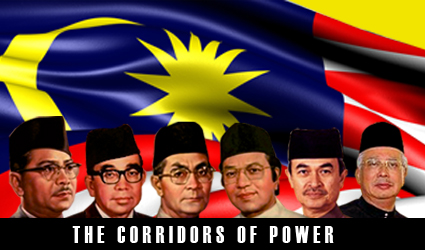
Mahathir’s resignation had nothing to do with the fact he is not a dictator. He had no choice. He either leaves or gets kicked out. And if he got kicked out he would have ended up in jail for all the crimes he had committed. So the only way to escape jail was to resign and hand over power to Abdullah. That was the deal Mahathir made with Abdullah and Umno.
THE CORRIDORS OF POWER
Raja Petra Kamarudin
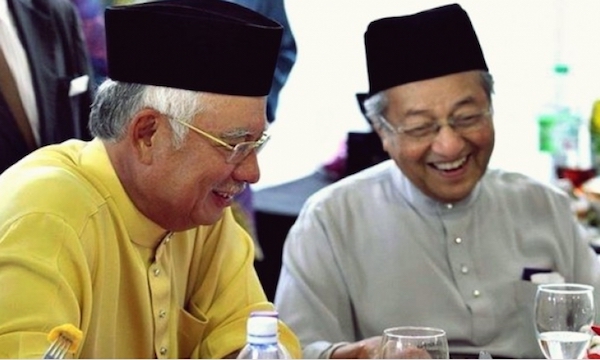
Najib, Not Me, Is The Dictator, Says Mahathir (READ HERE)
Let us analyse what Tun Dr Mahathir Mohamad said in his blog today.
1. “He has never allowed any challenge against him in the party. His deputy was sacked and he engineered the removal of my son, the menteri besar of Kedah, replacing him with one of his toadies.”
“No-contest ruling only weakens Umno,” said Malaysiakini on 11 April 2001 (READ HERE). In 2001 Mahathir was the Prime Minister and Tun Ghafar Baba the Deputy Prime Minister and Umno ruled there will be no contest for the number one and number two posts.
In fact, 2001 was not the first time that Mahathir did not allow any contest for the President’s and Deputy President’s post, as the extract from the book ‘Malaysian Politics under Mahathir’ reveals.
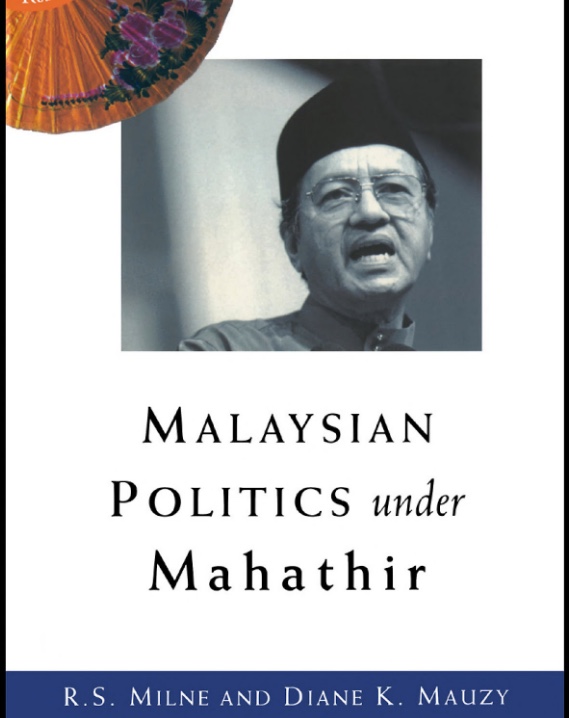

Has Mahathir forgotten this or does he think he can lie and get away with it?
With regards to Prime Minister Najib Tun Razak sacking his Deputy, that was what Mahathir did to Anwar Ibrahim in September 1998. Read this BBC news report of 2nd September 1998: Malaysia’s deputy prime minister fired (READ HERE)
With regards to Mukhriz Mahathir being removed as the Kedah Menteri Besar, Mahathir did the same to Syed Nahar Syed Sheh Shahabuddin in 1985 who was allied to the old regime of Tun Hussein Onn. Mahathir wanted Hussein’s Menteri Besar removed and replaced with his own man, Osman Arof.
Mahathir then removed Osman Arof as the Kedah Menteri Besar in 1996 because he had become too close to Tun Daim Zainuddin (Osman was Daim’s proxy in a few deals). Osman was replaced with Sanusi Junid (Mahathir’s right-hand-man). When Umno Kedah performed badly in the 1999 general election, Sanusi resigned and Mahathir appointed another loyalist, Syed Razak Syed Zain Barakbah, as the new Kedah Menteri Besar.
Mahathir would never accept any Kedah Menteri Besar who did not show 100% loyalty to him. And Mukhriz had stuck a knife in Najib’s back. Mahathir would have never allowed any Kedah Menteri Besar to do that to him and would have got rid of him for a lesser crime than that.
2. “There is now total censorship of the print and electronic media. He got the police to arrest and detain the people who reported on his alleged criminal activities.”
There is really no need to reply to this. The whole country knows about Operasi Lalang and the banning of many newspapers. The numerous ISA detentions from 1998 to 2001 were also because Mahathir could not tolerate any criticism.
During Mahathir’s time the Bersih rallies and the ‘Nothing to Hide’ events would never have been allowed. What the opposition is allowed to do since Najib took over as Prime Minister in 2009 would have only been a dream when Mahathir was Prime Minister. Read what Human Rights Watch had to say about the matter.
Human Rights Watch 2001 Report on Malaysia
The trial of former Deputy Prime Minister Anwar Ibrahim, culminating in his conviction for sodomy in August, provided the backdrop for the Malaysian government’s ongoing repression of perceived political opponents. While continuing to target liberal activists, the government stepped up its attacks on the fundamentalist Islamic party PAS (Parti Islam Se-Malaysia), following elections in November 1999. Human rights activists, lawyers, politicians, and publishers affiliated with the opposition were prosecuted under expansively-worded laws restricting freedom of expression. Police broke up peaceful rallies, arrested protestors, and beat some detainees in custody. Anwar’s conviction cast further doubt on the independence of Malaysia’s judicial system. Refugees and migrants faced harsh conditions in immigration detention camps, and Malaysia continued to return refugees to countries where they faced persecution. (READ MORE HERE)
Human Rights Watch 2002 Report on Malaysia
The government of Mahathir Mohamed, beginning his third decade as prime minister, continued to crack down hard on potential political challengers, arresting key opposition leaders, banning political rallies, and breaking up public gatherings with force. The year began with the prime minister’s popularity in decline. In November 2000, the ruling coalition suffered a by-election defeat in Mahathir’s home district in Kedah state and the government faced increasingly vocal opposition protests. In response, it turned the draconian Internal Security Act (ISA) against its political opponents. Among those targeted under the ISA, which allows detainees to be held indefinitely without charge or public airing of the evidence against them, were minority Shi’a Muslims, supporters of jailed former Deputy Prime Minister Anwar Ibrahim, and youth leaders in the opposition PAS (Partai Islam Se-Malaysia) party, although individuals linked to specific violent acts were also among those detained. In the wake of the September 11 attacks in the United States, authorities used global concern with terrorism to justify their actions. (READ MORE HERE)
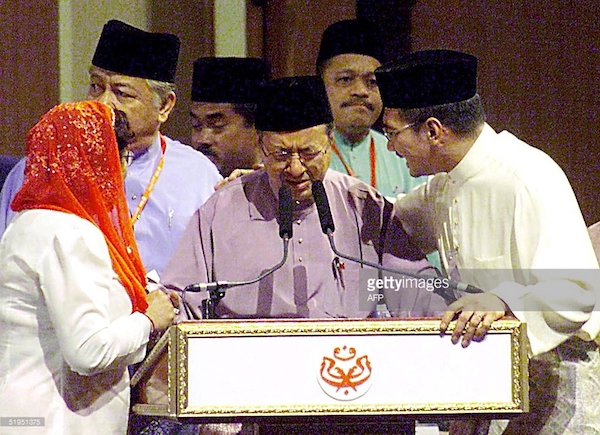
3. “Dictators never resign either. They would retain their place until they die. And always they would be succeeded by their sons. Dictators would have incurred the hatred of the people. They know once they lose power the people would abuse them and punish them. However, after I resigned, the people continued to accept and support me. Even opposition parties which used to condemn me have now chosen me as one of their leaders.”

In a moment of weakness Mahathir cried and announced his resignation during the 2002 Umno assembly but was persuaded to agree to a transition period of one year
Mahathir had no choice but to resign and hand power to Tun Abdullah Ahmad Badawi on 1st November 2003 because in a moment of weakness in mid-2002 Mahathir broke down and cried and announced his resignation during the Umno assembly. After an hour of negotiations backstage it was agreed that Mahathir would stay on a year more and then hand over power in 2003.
Umno then announced to the delegates that Mahathir will still resign but will hand power around a year later after the transition period is over. So Mahathir had no choice but to resign and hand power to Abdullah on 1st November 2003 because the deal had been sealed in stone and could no longer be aborted.
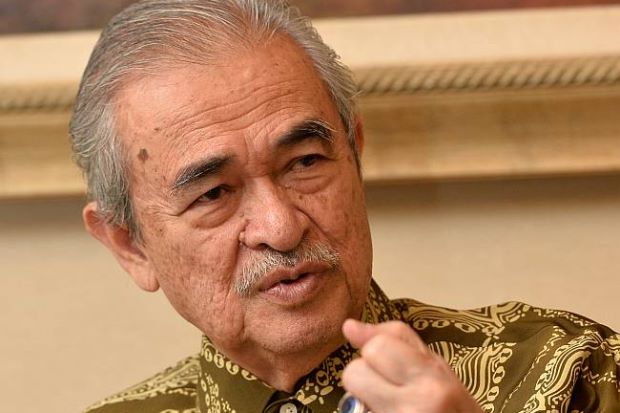
Abdullah saved Umno from losing the 2004 general election and saved Mahathir from going to jail
The Special Branch told Mahathir if he still stayed on then Umno and Barisan Nasional were going to lose the general election in 2004 because the people had had enough of him. Not long after Abdullah took over, the general election was held and Umno and Barisan Nasional performed the best ever in history. The people were so elated that Mahathir had gone that they gave Umno and Barisan Nasional a landslide victory.
So, Mahathir’s resignation had nothing to do with the fact he is not a dictator. He had no choice. He either leaves or gets kicked out. And if he got kicked out he would have ended up in jail for all the crimes he had committed. So the only way to escape jail was to resign and hand over power to Abdullah. That was the deal Mahathir made with Abdullah and Umno.
And Mahathir should not be so proud that ‘even opposition parties which used to condemn me have now chosen me as one of their leaders’. That just goes to show the opposition lacks morals and principles and has no maruah (dignity) or honour. That is like Israel appointing Adolf Hitler as its Prime Minister.

